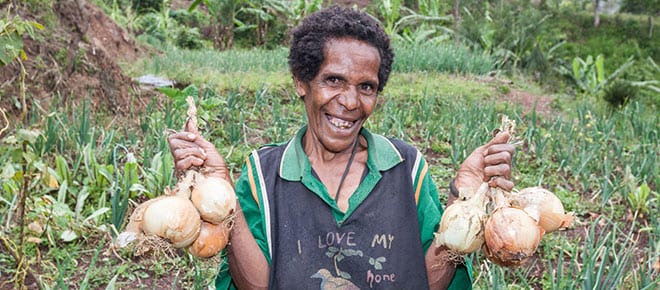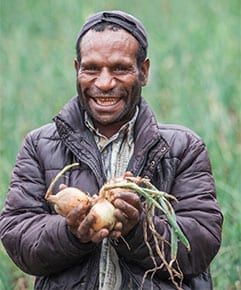A bulb onion scheme in Papua New Guinea’s Highlands is changing lives and securing futures for nearly 400 members of a remote community.

A bulb onion scheme in Papua New Guinea’s Highlands is changing lives and securing futures for nearly 400 members of a remote community.
Villagers in Perouglo, in Gembogl district of Simbu province are working together as part of the Individual Reform and Restoration Movement (IRRM) to grow and sell onions. The project received support from Oxfam supporters and the New Zealand Aid Programme.
Earning money is difficult for residents because Perouglo sits among peaks over 2000 metres high. The altitude limits the growth of cash crops such as coffee or bananas and the high terrain makes transport difficult, with just one rough, bumpy track in and out the village. IRRM has successfully implemented an income generating project for the community through growing bulb onions and selling the onions to local people and middlemen who represent supermarkets and hotels.
A versatile crop
Bulb onions were introduced to the region in 2004 and are grown by IRRM for a number of reasons. They are a popular savoury boost for many dishes and are rarely seen in the region as farmers tend to grow the same crops, increasing demand for them. They make three times as much money as other local varieties and grow well in the region’s well-drained, high-altitude soils. In addition to highly favourable climatic conditions, they can be harvested twice a year and are hardy enough to handle Perouglo’s bumpy road whilst being transported.
Production and marketing approach
Oxfam assisted 118 IRRM farmers (46 women and 72 men) with coordinating crop production, enabling them to sell a high volume of crop to formal and informal buyers. This coordination serves as IRRM’s competitive advantage: other producers in the area aren’t nearly as organised so are unable to get enough volume of bulb onions to markets, something highly valued by buyers given the economies of scale involved.
Five clusters of production, including one for youth, meant farmers were able to share their knowledge and experiences in planting and marketing. Twenty farmers from each of the five clusters were involved in a Training of Trainers scheme, the first of its kind for the community. This innovative step, which involved active participation of female farmers, ensured knowledge was embedded and shared across the community.
Results
With strong organisational skills, clear goals, high expectations and a solid work ethic, IRRM farmers have produced more than 700 30kg bags of onions in just one year with a single planting. Crucially, they have been able to attract enough buyers to earn a good profit. For an Oxfam investment of approximately K31,000 (NZ$15,400), IRRM bulb onion growers have been able to generate a gross profit over a year of over K80,000 (NZ$39,700).
 Impact
Impact
A lack of cash payments and transport historically represented two significant obstacles to entry into bulb onion growing for IRRM farmers. Selling a large volume enables IRRM to demand a cash payment from buyers, instead of buyers being able to demand credit that at times, isn’t repaid. IRRM are also able request that buyers supply transport.
Herman Nime, pictured, says the bulb onion project has changed lives. “Before the project, there was no way anyone in the village could make any money. Youths from a nearby tribe extorted money along the roadside near the village. They would set up a road block and cars could only pass after paying money. Our village got bad names from other people and surrounding communities.”
Since the onion project began he says, “It has changed all the youths. They have come in and joined IRRM. We look forward to good things in the community. So we are happy…We have a hope in the future. With your intervention, I have a future.”
Future growth
The project’s success has been such that 150 more local people have been recruited for the next bulb onion project. IRRM’s members have also been training another of Oxfam’s local community-based partner organisations, KGWan, to help them replicate IRRM’s success. They will work on producing a combined farm plan so they can consistently produce and supply the local markets. By working together, it’s estimated that next year, IRRM and KGWan will produce 2, 800 bags of bulb onions, potentially earning them K216, 000 (NZ$107,200).
- Discover more about Oxfam’s work in Papua New Guinea





 Impact
Impact